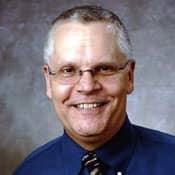Katie's notion of reinventing the news, in and of itself, was not a bad idea. But the blog comments and emails suggested that the person fronting it all proved in the early days to be notion's biggest liability. The unfair but real double-standard that forces women—be they politicians or pundits—to address issues of hair and make-up while their male counterparts can grow jowls and shiny pates, affected how Couric was perceived. Comments about her make-up, her hair, and her wardrobe dominated the blog, no matter what the actual topic.
But one of the most incendiary debates on the blog (and, in fact, in the newsroom) had nothing to do with clothes. It was furniture: Katie got in the habit of sitting on the anchor desk at the end of the show every Friday to say goodnight. Some viewers were horrified—I remember one who compared this posture to "acting like a sexy secretary from the '50s"—but Katie thought it was fun. She kept doing it until the president of the news division intervened.
The hair and wardrobe extremes, the desk-sitting all seemed like invitations to nitpick; they created distracting battles that didn't need to be fought, and reinforced the public perception of Couric as a lightweight, and so it went.
The ratings got worse. The press, sensing disaster, began circling. The tabloids—trumpeting that her days were numbered, that she was depressed and unhappy—were having a ball. They picked up every office spat and amplified it to a Sign of the End Times. Finally, a new executive producer was hired. He quickly addressed the cosmetic problems, mandating that Katie wear a suit jacket every night, and that she settle on a hairstyle. He also toughened the show's journalistic edge, even sending Katie into Iraq for several days in the summer of 2007.
But by then, people had made up their minds. The ratings never improved. Even her landmark series of interviews with Sarah Palin, which may well be reckoned as history-changing, failed to make a dent in the ratings. CBS had put together a stellar newscast, but with a star no one wanted to watch.
In her Times piece, Gail Collins surmises that Katie made things easier for the next woman who slid into the anchor chair, Diane Sawyer, at ABC. I don't think so. In fact, had CBS had wooed Sawyer to the Evening News, instead of Couric, the outcome might have been very different. Sawyer was a mature 60-something woman who had started out as a beauty queen, graduated to morning television (ironically, at CBS, where her pairing with Bill Kurtis actually made the beleaguered "CBS Morning News" competitive in that time slot), and then earned her journalistic stripes at "60 Minutes" and "Prime Time Live." There was a sense all along that, during those years Sawyer anchored "Good Morning America," she was slumming. She was less like Joan Lunden, more like Charles Collingwood in a dress, and when the time came, the torch passed from Charles Gibson to Sawyer with barely a hiccup in ratings and no public melodrama.
And that makes sense. Sawyer fits the mold for a TV anchor: intelligent, serious, articulate, comfortable in her skin; in a word, credible. Based on the thoroughly unscientific sampling I encountered at "Couric & Co.," too many folks found Katie Couric simply, well, incredible.
There are some lessons to be drawn from the Katie Couric era at CBS. A big one, to paraphrase Clint Eastwood, is to know your limitations. Know what you can do and what you can't. Know what you do well and what you don't. Know what people will accept and what they won't. And know when it's time to move on.
I can't help but think Katie will be a lot happier doing what she does best, and what people admire her for the most: thoughtful and engaging interviews that shed light and, every now and then, generate heat. If she goes ahead with reported plans to launch a talk show, she could probably make a serious run at being the next Oprah, and reinvent that form the way she'd hoped to reshape the Evening News.
Whatever happens, a short and tumultuous era in television history has come to a close. Nothing is certain in television, but maybe we can bet on this: CBS will go on without her. Katie is heading off to points-as-yet-unknown, about 75 million dollars richer. From the CBS experiment, she will have a lot of good stories to tell, and several interesting chapters for her memoirs. She'll likely become even richer before she decides to cash in her 401(k).
Her story is far from over. This may end up being just a brief interlude in her career.
Put another way: her heart will go on.





